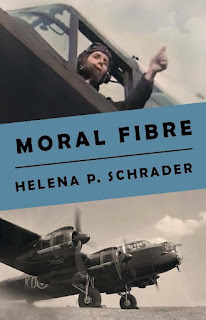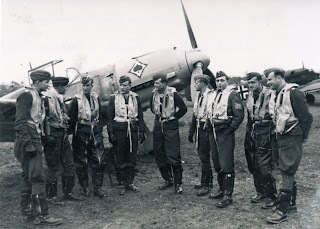Helena P. Schrader's Blog, page 14
February 21, 2023
Characters of "Eagles" - The Padre
There is an old saying that there are no atheists in a foxhole. That's true for the cockpit of a military aircraft in wartime, too. Sustained exposure to mortal danger tends to make believers of even the most irreverent and most sceptical. The RAF had and still has Commissioned Chaplains, who provide spiritual support, strength and guidance to service personnel. I chose to include such a figure in "Where Eagles Never Flew": Pilot Officer Colin Duport -- the "Padre"
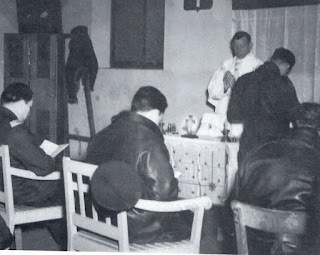
Excerpt:
"Oh, I'm sorry!" The upper-class accent made Ginger almost jump out of his skin. He turned and found himself face to face with the padre. "I didn't mean to intrude," the young clergyman apologized, and started to retreat.
Ginger felt he had to say something. "It's alright. I was just looking at the stars."
"Beautiful aren't they?" the padre agreed at once, stopping to look upwards. "Are you alright, by the way?" he asked, still looking upwards. "I heard you'd been shot down and were in the Channel for hours. Have you seen the MO?"
"No. I'm fine. Physically."
"And otherwise?"
The question was put so softly, but so intently, that Ginger wondered if the padre had really just chanced upon him after all -- or had he followed him out here intentionally? Suddenly it didn't matter. Ginger burst out angrily, "I saw three Spitfires shoot down a flying boat which was landing to rescue aircrew. It had red crosses all over it, and it was landing right beside the raft with the airmen in it! There couldn't be any question about what it was or what it was doing. And we shot it down -- not Jerry, not the Nazis, not the Hun! Spitfires of His Majesty's Royal Air Force with their roudels bright as day! Why?" Ginger turned to face the padre as he flung the last question at him. He saw the clergyman's eyes widen behind his thick glasses.
Colin was shocked. He licked his lips nervously. "I don't know," he answered honestly. "I suppose there must be a reason. I'll try to find out."
"Don't bother. It's too late."
Clergymen aren't born old and wise. They too start out young, innocent and certainly inexperienced. Colin Duport has only just been ordained and he doesn't have much experience in life, but he's been thrown in at the metaphorical "deep end." Instead of a typical vicarage serving a community of young and old, he is sent to an active RAF squadron in the midst of an air offensive. Tensions are high and the casualties mounting.
It doesn't help to be short-sighted with thick-framed glasses, or to be a penguin among eagles (or would-be eagles). Colin is very much alone, lonely and unsure of his utility. He had no power to solve anyone's problems. He can't stop the war, he can't get people leave or promoted. He doesn't have any power with the Almighty, either.
Colin has nothing to offer beyond his sincerity and his sympathy. Often that doesn't seem to be enough. His sense of helplessness increasingly challenges his own faith in God. But he can't stop trying, even if all he has to offer is a ear to talk or a shoulder to lean on. Colin's role in "Where Eagles Never Flew" is not great, yet he represents another strand in the fabric that made England strong enough to withstand the Nazi assault in 1940.
Excerpt continued:
"Sounds to me like you could do with a beer--"
"Alcohol isn't the answer to everything!" Ginger flung back at him bitterly.
Colin felt his own helplessness. "Tea, then. Would you like to join me?"
"No, I just want to be left alone."
That hurt, but Colin accepted it. "All right. Good night then."
No sooner had Colin retreated into the darkness than Ginger felt guilty about it. At least the padre had taken an interest -- the only one on the whole squadron to do so. And he was right. Ginger could have used a beer -- as long as it wasn't in a large noisy crowd. But it was too late; he'd chased away the only officer on the whole Station who had ever been nice to him.
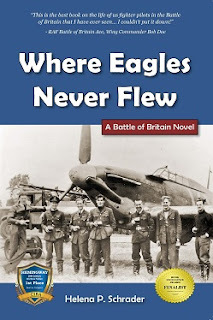
"This is the best book on the life of us fighter pilots in the Battle of Britain that I have ever seen.... I couldn't put it down."-- RAF Battle of Britain ace, Wing Commander Bob Doe.
Winner of a Hemingway Award for 20th Century Wartime Fiction, a Maincrest Media Award for Military Fiction and Silver in the Global Book Awards.
Find out more at: https://crossseaspress.com/where-eagles-never-flew
they took the war to Hitler.
Their chances of survival were less than fifty percent.
Their average age was 21.
This is the story of just one bomber pilot, his crew and the woman he loved.
It is intended as a tribute to them all.
or Barnes and Noble.
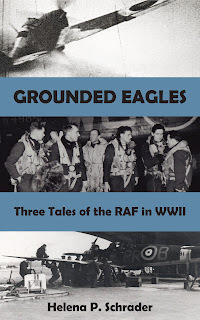 Disfiguring injuries, class prejudice and PTSD are the focus of three heart-wrenching tales set in WWII by award-winning novelist Helena P. Schrader. Find out more at: https://crossseaspress.com/grounded-eagles
Disfiguring injuries, class prejudice and PTSD are the focus of three heart-wrenching tales set in WWII by award-winning novelist Helena P. Schrader. Find out more at: https://crossseaspress.com/grounded-eagles
For more information about all my books visit: https://www.helenapschrader.com
February 14, 2023
Characters of "Eagles" - The Controller
The pilots of Fighter Command -- Churchill's "few" -- may have been the tip of the spear, but they could not have won the Battle of Britain on their own. Fundamental to British success in the summer of 1940 was the system of controlling the limited number of fighters available to the RAF. By linking the radar stations to command and control centers where the enemy aircraft were plotted and their intentions deduced, the RAF was able to deploy their resources sparingly and effectively. To highlight this critical aspect of the Battle, an important character in "Where Eagles Never Flew" is one of the controllers.
Ft/Lt Christopher "Bridges" Bainbridge - RAF Controller
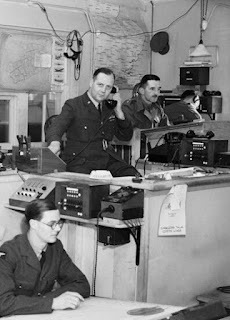
Excerpt:
It was noon and the next raid was building up over Calais again. Bainbridge started to suspect that the Germans had concentrated their forces over the Pas de Calais. Otherwise, they couldn't mount so many raids in one place in such quick succession. Park would have to ask Tangmere Sector for support soon. Bainbridge's eye wandered nervously between the boards below and the telephone connecting him directly to Park's HQ at Uxbridge. The raid moved inland. Manston again. This time communication to and from the airfield was knocked out.
Bainbridge stood and went to the railing of the gallery to stare at the map below. He tried to picture the coastline from Hastings to Ramsgate. That, apparently, was where the German army intended to force its way ashore. Hastings would undoubtedly appeal to the superstitious dictator, Bainbridge thought flippantly -- but without real levity. Someone had brought him a tray with lunch and he had not eaten a single bite. "Aren't you going to eat, sir?" ACW Roberts asked.
"No, you can take it away." She seemed to do so reluctantly.
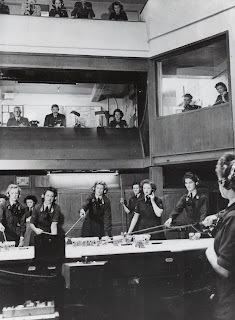 "Bridges", like most of the early controllers, was himself a pilot -- until a motor accident robbed him of one eye. Now, no longer judged fit to fly by the RAF medical establishment, he has been hastily retrained to serve as a "Sector Controller." All information from radar stations and the Observer Corps (which provided information not available from radar and of aircraft already in British airspace) was first sent to Fighter Command Headquarters at Bentley Priory. There it was filtered for duplication and other errors and then sent out to the "Sector Airfields." These controlled up to four fighter squadrons. The Sector Controllers were responsible guiding the aircraft based in their sector to interceptions with the enemy.
"Bridges", like most of the early controllers, was himself a pilot -- until a motor accident robbed him of one eye. Now, no longer judged fit to fly by the RAF medical establishment, he has been hastily retrained to serve as a "Sector Controller." All information from radar stations and the Observer Corps (which provided information not available from radar and of aircraft already in British airspace) was first sent to Fighter Command Headquarters at Bentley Priory. There it was filtered for duplication and other errors and then sent out to the "Sector Airfields." These controlled up to four fighter squadrons. The Sector Controllers were responsible guiding the aircraft based in their sector to interceptions with the enemy. When Bridges arrives at Tangmere he feels like a fish out of water. He no longer belongs to a squadron. Because of his injuries, he is no longer "one of the boys" either. He is a stranger in his own mess. Yet his job is critical and he soon realizes this. Before too long, the men flying know his voice and come to trust him, confident that he will do all he can to guide them to their prey -- and warn them of their predators. The relationship between Bridges and the squadrons he "controls" becomes strong.
Yet although he has only one physical eye, his job places him in a position to see more than the sharp-sighted young men flying Hurricanes. He can see the wider picture. The attacks and the feints of the enemy. He can form a picture of what they are attempting to achieve. He knows when they succeed and when they fail not just in the individual struggles of his squadrons but across the south coast of England.
Bridges role in "Where Eagles Never Flew" is to give the reader greater insight into overall developments and the wider picture -- as it looked at the time without the benefit of hindsight.
Excerpt continues:
Hastings was too far west, Bainbridge decided on second thought. If they were going to land at Hastings, they would be concentrating more in the Kenley and Tangmere Sectors. They must be planning to land nearer Dover. Land below the chalk cliffs? Were there cliffs all along the coast? Bainbridge was from Somerset and didn't known the south coast well. H was so lost in reflections about the impending invasion that he was taken by surprise when a plot went on the board at Cherbourg.
That would be fore them. He glanced at the clock; it was 3.40 pm. OK. Watch that carefully. Park wouldn't want them to scramble too soon. It was still building up. 100+ already, but the escorts were not doubt still joining up and circling the bomber squadrons.
Farther east, another raid was moving out of Calais again. Communication, meanwhile, had been restored to Manston. All accommodation had been leveled, and the airfield was so littered with unexploded bombs (aircrew error, and indication of declining German industrial efficiency, or an intentional new tactic?) that it was no longer usable. The order went out to the Manston squadrons to withdrew to Hornchurch.
Bainbridge noted: 15:45, August 24, 1940. The Germans achieve their second clear victory in the air war: they deny Fighter Command one of its forward airfields.
"This is the best book on the life of us fighter pilots in the Battle of Britain that I have ever seen.... I couldn't put it down."-- RAF Battle of Britain ace, Wing Commander Bob Doe.
Winner of a Hemingway Award for 20th Century Wartime Fiction, a Maincrest Media Award for Military Fiction and Silver in the Global Book Awards.
Find out more at: https://crossseaspress.com/where-eagles-never-flew
they took the war to Hitler.
Their chances of survival were less than fifty percent.
Their average age was 21.
This is the story of just one bomber pilot, his crew and the woman he loved.
It is intended as a tribute to them all.
or Barnes and Noble.
 Disfiguring injuries, class prejudice and PTSD are the focus of three heart-wrenching tales set in WWII by award-winning novelist Helena P. Schrader. Find out more at: https://crossseaspress.com/grounded-eagles
Disfiguring injuries, class prejudice and PTSD are the focus of three heart-wrenching tales set in WWII by award-winning novelist Helena P. Schrader. Find out more at: https://crossseaspress.com/grounded-eagles
For more information about all my books visit: https://www.helenapschrader.com
February 7, 2023
Characters of "Where Eagles Never Flew" - The Baron
During World War Two, some Germans claimed that they had a royal army, an imperial navy and a National Socialist air force. The expression was intended to highlight the different ethos dominating the respective services. Certainly the Luftwaffe was young and it was led by one of the most fanatical Nazis, Hermann Goering. Yet ultimately the young men who joined the Luftwaffe, like those who flocked to the RAF and USAF, were most attracted not by ideology but by the desire to fly.
Leutnant Christian Freiherr von Feldburg was one of them.
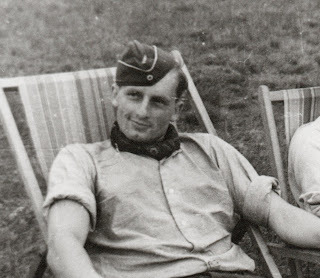
Excerpt:
"Fatty's gone and given Galland and Moelders Geschwader," Christian announced, as Ernst arrived for breakfast. It was at a "civilied" time this morning, because the Staffel wasn't slated to fly escort until the afternoon. Morning fog clung to the Channel, delaying all flying.
Ernst whistled. The papers had been full of pictures of them grinning beside the Reichsmarshall, shotguns over their arms, the slaughtered partridges inevitably likened to their mounting score of Spitfires and Hurricanes. Still, they were very junior and to command a Geschwader was to command three Gruppe of three Staffel each, or roughly 100 aircraft and more than a 1,500 men. Ernst considered Christian's expression and asked hesitantly, "Isn't that good?"
"Good? What's good about it? The Gallands and Moelders of this world care only about their personal glory. Haven't you heard? Their entire Gruppe had to hover about protecting them while they attacked alone -- bounce after bounce, running up their own score. Is that the most effective use of 40 fighters? Now, I suppose, they'll expect the whole damned Geschwader to 'protect' them!
Christian Freiherr von Feldburg is a child of privilege. Although his father was a wealthy Catholic nobleman and member of the German Reichstag for the Center Party. Christian has grown up with every advantage possible: wealth, parental love, a first rate education, and good looks. He is fortunate, too, to have an elder brother who dutifully assumes all the burdens and obligations of his old and noble family. Philip does all the "right" things, leaving Christian free to just have fun. Philip is also the serious one, the intellectual one, the man with a conscience. Philip is shocked by the Nazis, outraged by their policies, distressed by the consequences of aggression, frightened for the future of a nation that acts immorally. Christian just wants to fly fast aeroplanes and date pretty girls.
Christian's light-hearted attitude toward life in general is tolerated by his superiors, who see it as fundamentally harmless. His indifference to National Socialist ideology, on the other hand, is viewed as a more serious flaw. His jokes border on treason at times and he can be insubordinate -- both traits that hold him back from rapid promotion or the best assignments.
Nor is Christian the best pilot. He's not bad, but he's not Adolf Galland either. In fact, it takes him rather a long time before he can claim his first "kill." Yet there is no denying that most of his fellow pilots like him. He's generous, helpful, encouraging and fun to be with. He also knows how to inspire confidence and encourage the timid -- like Ernst Geuke.
Beneath his easy-going facade is a man who has not escaped his upbringing. He has learned the difference between right and wrong and he knows lies when he hears them. He has moral compass. Beneath the surface, remains a man of principle who will eventually break with the regime in his own way.
Excerpt Continues:
"Ah, Freiherr von Feldburg seeing the best in everything as usual." The CO thumped himself down in the chair opposite and shoved his cap back on his head.
Ernst sat up straighter and waited for what would happen next, Christian remained just as he was, side to the table, his long legs stretched out and crossed at the booted ankles.
"I do have some good news. We aren't flying escort this afternoon. We've been given a free hunt."
Christian sat up straighter. "That's more like it!"
"Apparently, Galland and Moelders talked Fatty into more of them."
"Of course! Gives them a better chance to run up their own scores." Christian's tone was instantly sneering again.
"Don't be jealous, Feldburg. It demeans you. Your own score could be higher, after all...."
Christian looked sharply at Ernst, but he knew Ernst hadn't betrayed him. Ernst had offered to lie for him outright. As Christian had jumped down after returning from yesterday's sortie, Ernst had been waiting for him to ask in a low voice, "Do you want me to say I saw it go in?"
"Of course not," Christian had retorted.
"But we can't claim it as it is," Ernst had protested in distress. "The engine was dead an the pilot was about to bail out, but we scared him back into the cockpit."
"So, we don't claim it," Christian had told him simply. "We don't say anything about it at all."
Ernst had done just that, so how had the CO found out about it? Or was he referring to something else?
The CO stood up again. "You need to decide what it is you want, Feldburg. No knowing might be dangerous one day."

"This is the best book on the life of us fighter pilots in the Battle of Britain that I have ever seen.... I couldn't put it down."-- RAF Battle of Britain ace, Wing Commander Bob Doe.
Winner of a Hemingway Award for 20th Century Wartime Fiction, a Maincrest Media Award for Military Fiction and Silver in the Global Book Awards.
Find out more at: https://crossseaspress.com/where-eagles-never-flew
they took the war to Hitler.
Their chances of survival were less than fifty percent.
Their average age was 21.
This is the story of just one bomber pilot, his crew and the woman he loved.
It is intended as a tribute to them all.
or Barnes and Noble.
 Disfiguring injuries, class prejudice and PTSD are the focus of three heart-wrenching tales set in WWII by award-winning novelist Helena P. Schrader. Find out more at: https://crossseaspress.com/grounded-eagles
Disfiguring injuries, class prejudice and PTSD are the focus of three heart-wrenching tales set in WWII by award-winning novelist Helena P. Schrader. Find out more at: https://crossseaspress.com/grounded-eagles
For more information about all my books visit: https://www.helenapschrader.com
January 31, 2023
Characters of "Eagles" - The Sprog
RAF fighter pilots in the Battle of Britain were young. The average age was 20, and many pilots were still in their teens. The majority were too young to vote, and many did not have a driver's license. Most had not gone to the RAF cadet academy Cranwell and earned the king's commission. The majority were weekend fliers who'd joined the "Volunteer Reserve" or airmen who had been given the opportunity to learn to fly while doing other less glamorous ground duties. The bulk of both these latter categories were from the segments of society that didn't finish school much less go on to university and who did not have the money for private flying lessons. They became the backbone of Fighter Command: the Sergeant Pilots.
Today I introduce Sergeant Pilot George "Ginger" Bowles
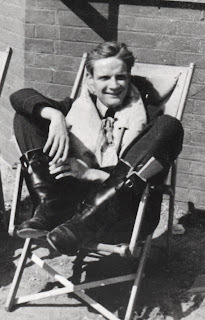 Excerpt:
Excerpt:It could only be his Dad. No one else would phone him. Or had something happened to his Dad? What if he'd had some kind of accident? His father was doing that thatching job. What if he'd fallen off the roof and broken his back like Sanders? Ginger started moving faster. He hurried down the stairs. In the reception was a switchboard manned by a WAAF. She motioned him to one of the wooden pone booths, and a moment later the telephone in it rang. Ginger grabbed the receiver. "Bowles. Sergeant Pilot Bowles," he improved.
"Ginger?" It was his Dad's voice, and Ginger let out a long sigh of relief. "Did you hear the PM's speech last night, lad?" The senior Bowles sounded excited, almost breathless.
The swing in emotions had been too rapid, and Ginger found his eyes watering. Annoyed with his own weakness, acutely aware of his fragile nerves, Ginger answered with uncharacteristic cynicism. "I'm glad the PM thinks we're turning the tide of war, Dad, because frankly, it doesn't feel like that from where I'm standing."
Ginger comes form a poor, rural background. His widowed father makes a living doing odd jobs, and lives in a rundown old cottage without proper plumbing. Ginger's secondary education came entirely via scholarship, and getting accepted into the RAF Voluntary Reserve was the greatest moment of his short life.
Ginger loves flying but he's fundamentally an introvert and most happy out on his own walking his dog or playing among the clouds in an open cockpit biplane. He's not comfortable in a noisy crowd of fellow teenagers -- certainly not when they're drinking too much. He's even more intimidated by the upper class accents and manners of the officers.
But the biggest shock when he joins his first operational squadron at RAF Tangmere in late June 1940 is the Me109 that strafes the field just as he's coming out of the adjutant's office. When he'd joined the RAFVR, all he'd thought about was flying -- not fighting and dying. Suddenly, the war isn't in the newspapers anymore -- or in France either. It's in front of his face and he knows in the marrow of his bones that he isn't up to what's going to be asked of him.
He knows he's still a novice pilot. He knows that he knows nothing about dogfighting. Still struggling to fully master the powerful flying machine the RAF has entrusted him with, he can't keep formation to the standard the CO demands. Concentrating on staying in formation, however, he gets bounced by the Germans, further undermining his confidence. He's desperately afraid that he is the weakest link in the chain and that he endangers the entire squadron. The next time he sees the enemy, th physically tension causes him to be physically ill -- over the floor of his cockpit.
And yet... the ground crew is first rate. He knows they take pride in ensuring his aircraft is absolutely at its best. They won't let him clean up his own mess either. They say it's part of their job. They look after him. And the padre is nice too and wants to help. Ginger is determined to keep flying and to improve. He doesn't want to prove those people right, who have always looked down on his day and him as worthless trash.
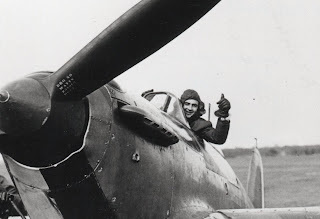
Excerpt Continues:
"That's not the point, Ginger! I mean, it was what he said about what we all owe you. After the BBC broadcast, everyone started congratulating me -- people I hardly knew! Total strangers, even. They came up to me in the pub -- I was down to town to shop and stopped in 'fore coming home for just a quick one. But the radio was on, and after the PM spoke, everyone started slapping me on the back and congratulating me -- but it was all meant for you."
The thought of his despised and ridiculed father being the center of approving attention was so poignant that Ginger had to fight back tears again. He was glad that his father was still talking excitedly so he didn't need to speak. Mr Bowles was saying, "I had to tell you that, Ginger. The PM was speaking for all of us. We know you're all that stands between us and the Nazis. We know what the Nazis would do to us --if it weren't for you and your mates."
"They still might, Dad. No matter what the PM said, we haven't won yet." It came out rather harsh, because Ginger was so confused by his own emotions that he could only cope by being hard.
"I know, Ginger. But we're all behind you. And I've never been so proud in all my life."
"Thanks, Dad," Ginger's voice softened.
"Wish I could come and see you, lad. If I came to Chichester, could you get some time off? Just a couple of hours, I mean? Time for a quiet pint together?"
"It'd be an awful lot of trouble for you, Dad." Part of Ginger desperately wanted to see his Dad, but he was a little afraid of it, too. He couldn't introduce his Dad around to the others; they'd laugh at him for his country clothes, speech and manners.
"One day's all I'm asking for, lad. Or an afternoon. Just to see you again."
"Well, I suppose I could ask, but don't you think--"
"I'll look into it tomorrow. Now you take care of yourself, all right?"
"I do my best, Dad."
"I know you do. That's how you got where you are. Take care of yourself!" He shouted into the receiver and then hung up before Ginger could hear how choked up he was -- but Ginger heard anyway. They knew each other too well.

"This is the best book on the life of us fighter pilots in the Battle of Britain that I have ever seen.... I couldn't put it down."-- RAF Battle of Britain ace, Wing Commander Bob Doe.
Winner of a Hemingway Award for 20th Century Wartime Fiction, a Maincrest Media Award for Military Fiction and Silver in the Global Book Awards.
Find out more at: https://crossseaspress.com/where-eagles-never-flew
they took the war to Hitler.
Their chances of survival were less than fifty percent.
Their average age was 21.
This is the story of just one bomber pilot, his crew and the woman he loved.
It is intended as a tribute to them all.
or Barnes and Noble.
 Disfiguring injuries, class prejudice and PTSD are the focus of three heart-wrenching tales set in WWII by award-winning novelist Helena P. Schrader. Find out more at: https://crossseaspress.com/grounded-eagles
Disfiguring injuries, class prejudice and PTSD are the focus of three heart-wrenching tales set in WWII by award-winning novelist Helena P. Schrader. Find out more at: https://crossseaspress.com/grounded-eagles
For more information about all my books visit: https://www.helenapschrader.com
January 24, 2023
Characters of "Eagles" - Children, Church and -- Communications
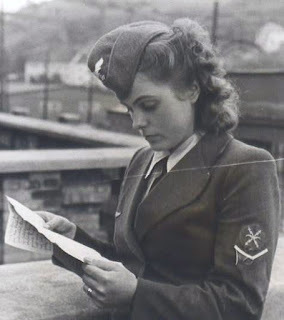
"Never in the history of the world," the Luftwaffe recruiter told the teenage girls from the National Socialist Labor Front, "has an air force been asked to perform a comparable task. The Luftwaffe burns to show the Fuehrer what it can do. But," the teacher-turned-airforce-major stopped dramatically, "but the Luftwaffe needs help. It needs your help."
The astonished looks of the two Labor Girls were highly satisfying to the lecturer. "You will be able to tell your children and grandchildren that you -- no less than your brothers and boyfriends in our bomber crews -- helped to subdue the stubborn British lion. Your Camp Leader has selected you as the girls most suitable for this awesome task. Now, I put the question to you: are you willing to help your Fatherland and your Fuehrer by becoming Luftwaffehelferinnen?"
The recruiter had not yet met teenage girls who could resist his harangue.
From the point of view of the Nazi authorities, Klaudia's suitability for the Luftwaffe women's auxiliary was based primarily on her docility, her apparently sincere desire to be a good National Socialist -- and her name. Her father is a second cousin once removed to the legendary WWI ace Baron Manfred von Richthofen and she carries his famous name. In fact, however, Klaudia doesn't know much about either the Luftwaffe or National Socialism. She has grown up on a large estate in the east, the daughter of the estate owner. She is the only surviving child of grief-stricken parents, and has had a lonely childhood because her parents were to deeply wounded by the loss of her brother to give her the love she needs. The village school is also small and she is set apart by her status as the daughter of the landowner. It is not until she reports for her national labor service that she finds herself on an equal-footing among lots of girls her own age. (Young people in Nazi Germany had to serve one year in the Reichsarbeitsdienst or RAD, a highly militarized organization which also sought to indoctrinate youth in National Socialism.)
Suddenly, Klaudia is not only surrounded by girls her own age, she is surrounded by National Socialist institutions, slogans, songs, uniforms and ideology. The change in society, which had largely passed her rural village by, can no longer be ignored. Klaudia is only too willing to embrace the "new Germany". It offers her acceptance and integration and a bright future. So when the Luftwaffe comes to her RAD unit recruiting women to train in communication trades, Klaudia is eager to sign up.
Nor is she disappointed. Work as a Luftwaffehelferinnen soon enables her to go to France. She and her friend Rosa land with the creme-de-la-creme at No. 1 Stuka Group. She finds herself living in a chateau and courted by the most glamorous of the all pilots -- the CO himself, Major Pashinger. Klaudia's sheltered childhood has not prepared for any of this. In very little time, she has been seduced -- only to discover that Pashinger is a married man and his intentions were dishonorable from the start.
Fortunately for Klaudia, her friend Rosa is seeking a transfer to another unit to follow her young man, an aircraft mechanic. Klaudia joins her, and together they arrive at JG 23. The atmosphere here is very different -- less glamorous and less political. These aren't Goering's or Hitler's favorites. Some of the pilots are outright contemptuous of the Nazis. Klaudia is much happier, and knows she would find it hard to resist the charm of Christian Baron von Feldburg -- if only he would show any interest in her.
But Feldburg has eyes only for French girls, and it is his wingman, Ernst Geuke, who has fallen for Klaudia. Ernst isn't exactly dashing, however, and he certainly doesn't come from the kind of background her parents would approve of. Klaudia subtly lets Ernst know she's not interested in his attentions. And then he gets shot down.

"This is the best book on the life of us fighter pilots in the Battle of Britain that I have ever seen.... I couldn't put it down."-- RAF Battle of Britain ace, Wing Commander Bob Doe.
Winner of a Hemingway Award for 20th Century Wartime Fiction, a Maincrest Media Award for Military Fiction and Silver in the Global Book Awards.
Find out more at: https://crossseaspress.com/where-eagles-never-flew
Also by Helena P. Schrader
they took the war to Hitler.
Their chances of survival were less than fifty percent.
Their average age was 21.
This is the story of just one bomber pilot, his crew and the woman he loved.
It is intended as a tribute to them all.
or Barnes and Noble.
 Disfiguring injuries, class prejudice and PTSD are the focus of three heart-wrenching tales set in WWII by award-winning novelist Helena P. Schrader. Find out more at: https://crossseaspress.com/grounded-eagles
Disfiguring injuries, class prejudice and PTSD are the focus of three heart-wrenching tales set in WWII by award-winning novelist Helena P. Schrader. Find out more at: https://crossseaspress.com/grounded-eagles
For more information about all my books visit: https://www.helenapschrader.com
January 17, 2023
Characters of "Eagles" - The Girl from the Sally Ann Canteen
Continuing my series on the most important characters in "Where Eagles Never Flew," today I introduce the main female protagonist. One of the main objectives when writing "Where Eagles Never Flew" was to show -- and give credit to -- the various non-flying contributors to British victory. Some of the least dramatic, least heroic and least glamorous were the women who served in the various volunteer organizations that gave out tea, sandwiches and buns to those fighting -- whether they were being evacuated from Dunkirk or preparing for D-Day. When the novel opens, Emily Priestman is just another volunteer at the Salvation Army.
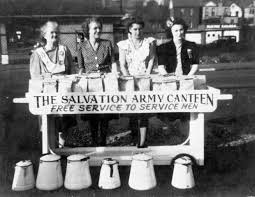 "I hope you don't mind me asking, but what is a nice girl like you doing in a place like this?"
"I hope you don't mind me asking, but what is a nice girl like you doing in a place like this?" "What makes you think I'm a nice girl?" Emily quipped back. Without thinking, she fell into the kind of repartee that was so much a part of her University days.
He laughed, but retorted without missing a beat: "Innocent until proven guilty -- or some such thing."
Emily has chosen to volunteer at the Salvation Army rather than joining one of the women's auxiliary services because she is fundamentally a pacifist. The daughter of Communist activists, who moved to Portsmouth to raise the level of education (and political awareness) among the working class, she went to Cambridge on a scholarship. While studying medieval history there during the mid-thirties, she became active in the Peace Society -- and fell in love with a fellow-student passionately opposed to war, Michael.
She soon discovers, however, that while she and Michael share politics and values, they don't share the same sexual orientation; Michael isn't interested in women physically. That disappointment is followed by another when she learns that degrees in medieval history don't open many doors. Unable to compete for academic jobs with male graduates, she's returns to Portsmouth to live with her parents and look for other work.
Her parents live by choice in one of the most impoverished parts of a poor city. The terraced houses are dirty, dilapidated and inhabited by people on the down-and-out. As loyal Communists, Emily's parents now support Hitler because he is suddenly an ally of Stalin. They condemn the British government at every turn. In contrast, Emily's pacifism has been undermined by Hitler's aggression. Although she has read John Maynard Keynes' "The Economic Consequences of the Peace" and recognizes that Germany had legitimate grievances against the post-war regime, she cannot accept that this gives Germany the right to invade its neighbors. She sees clearly that Hitler cannot be stopped by diplomatic means; she recognizes that force is the only language he understands. Emily and her parents clash over politics and and a relationship that was always cold becomes frigid.
Eventually Emily finds a job as a clerk with an insurance broker and starts work. Yet she is over-qualified for the job she is doing and her female co-workers are suspicious and jealous of her. She has the "wrong" (educated) accent, she listens to "posh" music, and reads the Times. Emily feels as lonely among them as with her parents. Working weekends at the Salvation Army with the dynamic and self-sufficient Hattie Fitzsimmons becomes the only positive feature of her life.
Then one day a young man in civilian clothes and propped up on a crutch comes to her rescue when she's trying to cope with a flood of sailors come for a hot meal. She mistakes him for a conscientious objector, only to find he's a fighter pilot injured in France. When he offers to take her up for "flip", she can't resist the temptation. The result is that all too soon she has fallen in love -- with both the pilot and the flying.
Emily will go on to fly herself in the ATA -- but that is long after the end of "Where Eagles Never Flew."

"This is the best book on the life of us fighter pilots in the Battle of Britain that I have ever seen.... I couldn't put it down."-- RAF Battle of Britain ace, Wing Commander Bob Doe.
Winner of a Hemingway Award for 20th Century Wartime Fiction, a Maincrest Media Award for Military Fiction and Silver in the Global Book Awards.
Find out more at: https://crossseaspress.com/where-eagles-never-flew
Also by Helena P. Schrader
they took the war to Hitler.
Their chances of survival were less than fifty percent.
Their average age was 21.
This is the story of just one bomber pilot, his crew and the woman he loved.
It is intended as a tribute to them all.
or Barnes and Noble.
 Disfiguring injuries, class prejudice and PTSD are the focus of three heart-wrenching tales set in WWII by award-winning novelist Helena P. Schrader. Find out more at: https://crossseaspress.com/grounded-eagles
Disfiguring injuries, class prejudice and PTSD are the focus of three heart-wrenching tales set in WWII by award-winning novelist Helena P. Schrader. Find out more at: https://crossseaspress.com/grounded-eagles
For more information about all my books visit: https://www.helenapschrader.com
January 10, 2023
Characters of "Eagles" - Unlikely Luftwaffe Eagle
Continuing my series on the most important characters in "Where Eagles Never Flew," today I introduce the most important of the German characters. One of the unique features of "Where Eagles Never Flew" is that the novel follows the fate not only of an RAF fighter squadron but also a Luftwaffe fighter wing. The three main German characters are members of this fiction JG 23. Today I introduce Leutnant Ernst Geuke
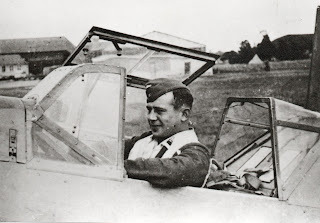 "Bartels was tall, blond, tanned and fit -- a German officer straight out of a UFA-film. He considered Geuke with a mixture of disbelief and annoyance. Geuke could hear him thinking, "Have we really sunk so low that we have to take officers like this?'" Ernst doesn't look the part of a fighter pilot, at least not Goebbels idea of one. He isn't blond, or tall, or particularly good looking. In fact, he is what one doctor called "a good feeder" -- meaning that not either the Hitler Youth nor the Luftwaffe was able to make him look sleek. He retains a roundness regardless.
"Bartels was tall, blond, tanned and fit -- a German officer straight out of a UFA-film. He considered Geuke with a mixture of disbelief and annoyance. Geuke could hear him thinking, "Have we really sunk so low that we have to take officers like this?'" Ernst doesn't look the part of a fighter pilot, at least not Goebbels idea of one. He isn't blond, or tall, or particularly good looking. In fact, he is what one doctor called "a good feeder" -- meaning that not either the Hitler Youth nor the Luftwaffe was able to make him look sleek. He retains a roundness regardless.It doesn't help that he also comes from a humble background. His father is a plumber in the provincial town of Cottbus, and he has four siblings. He grew up poor surrounded by similar hard-working people who lost loved one and suffered severe deprivation during the First World War, and then lost all their savings in the inflation of 1923. Embittered by the hardship and the apparent indifference of the government to their plight, they enthusiastically embrace the new movement promising to make Germany great again.
Ernst is thus a Nazi by default more than anything. With his parents, his teachers, his pastors and his classmates all mesmerized by Hitler and his lies, Ernst goes along congenially. His only real passion is flying, and being far too poor to take private flying lessons, his only change of flying is to be accepted into the Luftwaffe.
Once in, Ernst works hard not fail and earns not only his wings but a commission as well. He's proud of that, but it doesn't give him the money for tailored uniforms (as the aristocratic officers have) and it doesn't change his provincial accent or make him slimmer either. Ernst is an outsider and acutely aware of it when he first reports for duty at JG 23, stationed at a hastily constructed grass airfield near Cherbourg in Normandy.
Acutely aware of his inexperience and imagining inadequacies, Ernst is self-effacing and anxious to "fit in." When things go wrong, he's quick to blame himself. He's not at all prepared to withstand the charm of Christian Baron von Feldburg, who rapidly takes Ernst under his wing -- as his "wingman." He's even less prepared to deal with his feelings for the pretty but shy Luftwaffehilferin Klaudia von Richthofen.
"This is the best book on the life of us fighter pilots in the Battle of Britain that I have ever seen.... I couldn't put it down."-- RAF Battle of Britain ace, Wing Commander Bob Doe.
Winner of a Hemingway Award for 20th Century Wartime Fiction, a Maincrest Media Award for Military Fiction and Silver in the Global Book Awards.
Find out more at: https://crossseaspress.com/where-eagles-never-flew
Also by Helena P. Schrader
they took the war to Hitler.
Their chances of survival were less than fifty percent.
Their average age was 21.
This is the story of just one bomber pilot, his crew and the woman he loved.
It is intended as a tribute to them all.
or Barnes and Noble.
 Disfiguring injuries, class prejudice and PTSD are the focus of three heart-wrenching tales set in WWII by award-winning novelist Helena P. Schrader. Find out more at: https://crossseaspress.com/grounded-eagles
Disfiguring injuries, class prejudice and PTSD are the focus of three heart-wrenching tales set in WWII by award-winning novelist Helena P. Schrader. Find out more at: https://crossseaspress.com/grounded-eagles
For more information about all my books visit: https://www.helenapschrader.com
Characters of "Eagles" - Main German Protagonist
Continuing my series on the most important characters in "Where Eagles Never Flew," today I introduce the most important of the German characters. One of the unique features of "Where Eagles Never Flew" is that the novel follows the fate not only of an RAF fighter squadron but also a Luftwaffe fighter wing. The three main German characters are members of this fiction JG 23. Today I introduce Leutnant Ernst Geuke
 "Bartels was tall, blond, tanned and fit -- a German officer straight out of a UFA-film. He considered Geuke with a mixture of disbelief and annoyance. Geuke could hear him thinking, "Have we really sunk so low that we have to take officers like this?'" Ernst doesn't look the part of a fighter pilot, at least not Goebbels idea of one. He isn't blond, or tall, or particularly good looking. In fact, he is what one doctor called "a good feeder" -- meaning that not either the Hitler Youth nor the Luftwaffe was able to make him look sleek. He retains a roundness regardless.
"Bartels was tall, blond, tanned and fit -- a German officer straight out of a UFA-film. He considered Geuke with a mixture of disbelief and annoyance. Geuke could hear him thinking, "Have we really sunk so low that we have to take officers like this?'" Ernst doesn't look the part of a fighter pilot, at least not Goebbels idea of one. He isn't blond, or tall, or particularly good looking. In fact, he is what one doctor called "a good feeder" -- meaning that not either the Hitler Youth nor the Luftwaffe was able to make him look sleek. He retains a roundness regardless.It doesn't help that he also comes from a humble background. His father is a plumber in the provincial town of Cottbus, and he has four siblings. He grew up poor surrounded by similar hard-working people who lost loved one and suffered severe deprivation during the First World War, and then lost all their savings in the inflation of 1923. Embittered by the hardship and the apparent indifference of the government to their plight, they enthusiastically embrace the new movement promising to make Germany great again.
Ernst is thus a Nazi by default more than anything. With his parents, his teachers, his pastors and his classmates all mesmerized by Hitler and his lies, Ernst goes along congenially. His only real passion is flying, and being far too poor to take private flying lessons, his only change of flying is to be accepted into the Luftwaffe.
Once in, Ernst works hard not fail and earns not only his wings but a commission as well. He's proud of that, but it doesn't give him the money for tailored uniforms (as the aristocratic officers have) and it doesn't change his provincial accent or make him slimmer either. Ernst is an outsider and acutely aware of it when he first reports for duty at JG 23, stationed at a hastily constructed grass airfield near Cherbourg in Normandy.
Acutely aware of his inexperience and imagining inadequacies, Ernst is self-effacing and anxious to "fit in." When things go wrong, he's quick to blame himself. He's not at all prepared to withstand the charm of Christian Baron von Feldburg, who rapidly takes Ernst under his wing -- as his "wingman." He's even less prepared to deal with his feelings for the pretty but shy Luftwaffehilferin Klaudia von Richthofen.
"This is the best book on the life of us fighter pilots in the Battle of Britain that I have ever seen.... I couldn't put it down."-- RAF Battle of Britain ace, Wing Commander Bob Doe.
Winner of a Hemingway Award for 20th Century Wartime Fiction, a Maincrest Media Award for Military Fiction and Silver in the Global Book Awards.
Find out more at: https://crossseaspress.com/where-eagles-never-flew
Also by Helena P. Schrader
they took the war to Hitler.
Their chances of survival were less than fifty percent.
Their average age was 21.
This is the story of just one bomber pilot, his crew and the woman he loved.
It is intended as a tribute to them all.
or Barnes and Noble.
 Disfiguring injuries, class prejudice and PTSD are the focus of three heart-wrenching tales set in WWII by award-winning novelist Helena P. Schrader. Find out more at: https://crossseaspress.com/grounded-eagles
Disfiguring injuries, class prejudice and PTSD are the focus of three heart-wrenching tales set in WWII by award-winning novelist Helena P. Schrader. Find out more at: https://crossseaspress.com/grounded-eagles
For more information about all my books visit: https://www.helenapschrader.com
January 3, 2023
Characters of "Where Eagles Never Flew" - Reformed Playboy
All my novels are character-driven and each character contributes materially to the shape and texture of the book. Over the next weeks I plan to introduce the most important characters in "Where Eagles Never Flew."
Today I introduce the main male protagonist, Robert "Robin" Priestman
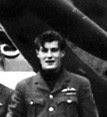
"The others scrambled up the off wing and peered into his Hurricane. There were a lot of admiring whistles and excited comments. Priestman left the others to it and slid to the ground leaning against the trailing edge of the wing. Only once before had he been so conscious of divine protection -- after capsizing a small boat in a Force Five gale in the Solent. Then he'd been a foolish 15-year-old boy, who had over-estimated his abilities and for whom God had no doubt felt pity. Today, with so many others dead, it was hard to understand why he should have been one of the lucky ones."
When the novel opens in May 1940, "Robin" is a Flying Officer in a Hurricane Squadron. The posthumous son of a navy officer, he has grown up in Portsmouth in straightened circumstances; his mother had no income aside from a Royal Navy pension. Fortunately for Robin, his paternal grandfather was willing to finance his education at a lesser-known public school, and his aunt paid his way through Cranwell. Rather than being humble and sober, as such a background might suggest, however, Robin has a track record of dubious escapades.
Most seriously and recently, while serving in the Far East on a torpedo bomber squadron, he challenged a pilot of the Imperial Japanese Navy to an aerobatics duel. While his main intent was to get his hands on the controls of Japan's latest fighter and test fly it, the result was the Japanese pilot killing himself -- and crashing in the RAF Wildebeest. HM's Air Ministry was not amused.
Then again, having proved he was very good at aerobatics and keenly competitive, the RAF thought maybe he would be a good addition to the RAF's aerobatics team. So for much of 1938-1939, he took part in international shows and competitions with the rest of the team. It was a heady time of international travel, dangerous flying, champagne and socialites.
Speaking of which, Robin never had any trouble attracting women. His bigger problem is shaking them off. Very focused on his career, however, he was always determined not to let any girl get in the way. What that meant was not getting attached or involved with anyone he would have to take "seriously." He was careful to flit from one bright starlet to the next among the upper class girls, to avoid middle glass girls altogether, and have his illicit fun with girls from the lower class.
And then the war came.
A professional with hundreds of flying hours, Robin is ready -- indeed anxious -- to do his duty. He fully comprehends the issues at stake and is determined to do all he can to stop a Nazi invasion. In his first encounters with the Luftwaffe, he is shot up -- and shot down. He confronts his mortality, but learns very fast. Within ten days, as the casualties pile up, he becomes a flight commander and acting squadron leader. And then his luck runs out.
Badly injured, he is taken out of Dunkirk by ship and assigned to Training Command. His job, he is told, is to help other pilots learn the skills that will enable them to survive.
Robin is neither a good instructor (flying comes too naturally to him to be able to explain it to others) nor is he happy out of the fray with Britain's fate more at risk than ever before. He longs to get back to the front lines. And quite unexpectedly and inconveniently, he meets a woman who threatens all his principles about not getting involved with nice girls.

"This is the best book on the life of us fighter pilots in the Battle of Britain that I have ever seen.... I couldn't put it down."-- RAF Battle of Britain ace, Wing Commander Bob Doe.
Winner of a Hemingway Award for 20th Century Wartime Fiction, a Maincrest Media Award for Military Fiction and winner of "Silver" in the Global Book Awards.
Find out more at: https://crossseaspress.com/where-eagles-never-flew
Also by Helena P. Schrader
they took the war to Hitler.
Their chances of survival were less than fifty percent.
Their average age was 21.
This is the story of just one bomber pilot, his crew and the woman he loved.
It is intended as a tribute to them all.
or Barnes and Noble.
 Disfiguring injuries, class prejudice and PTSD are the focus of three heart-wrenching tales set in WWII by award-winning novelist Helena P. Schrader. Find out more at: https://crossseaspress.com/grounded-eagles
Disfiguring injuries, class prejudice and PTSD are the focus of three heart-wrenching tales set in WWII by award-winning novelist Helena P. Schrader. Find out more at: https://crossseaspress.com/grounded-eagles
For more information about all my books visit: https://www.helenapschrader.com
Characters of "Where Eagles Never Flew" - Main Male Protagonist
All my novels are character-driven and each character contributes materially to the shape and texture of the book. Over the next weeks I plan to introduce the most important characters in "Where Eagles Never Flew."
Today I introduce the main male protagonist, Robert "Robin" Priestman

"The others scrambled up the off wing and peered into his Hurricane. There were a lot of admiring whistles and excited comments. Priestman left the others to it and slid to the ground leaning against the trailing edge of the wing. Only once before had he been so conscious of divine protection -- after capsizing a small boat in a Force Five gale in the Solent. Then he'd been a foolish 15-year-old boy, who had over-estimated his abilities and for whom God had no doubt felt pity. Today, with so many others dead, it was hard to understand why he should have been one of the lucky ones."
When the novel opens in May 1940, "Robin" is a Flying Officer in a Hurricane Squadron. The posthumous son of a navy officer, he has grown up in Portsmouth in straightened circumstances; his mother had no income aside from a Royal Navy pension. Fortunately for Robin, his paternal grandfather was willing to finance his education at a lesser-known public school, and his aunt paid his way through Cranwell. Rather than being humble and sober, as such a background might suggest, however, Robin has a track record of dubious escapades.
Most seriously and recently, while serving in the Far East on a torpedo bomber squadron, he challenged a pilot of the Imperial Japanese Navy to an aerobatics duel. While his main intent was to get his hands on the controls of Japan's latest fighter and test fly it, the result was the Japanese pilot killing himself -- and crashing in the RAF Wildebeest. HM's Air Ministry was not amused.
Then again, having proved he was very good at aerobatics and keenly competitive, the RAF thought maybe he would be a good addition to the RAF's aerobatics team. So for much of 1938-1939, he took part in international shows and competitions with the rest of the team. It was a heady time of international travel, dangerous flying, champagne and socialites.
Speaking of which, Robin never had any trouble attracting women. His bigger problem is shaking them off. Very focused on his career, however, he was always determined not to let any girl get in the way. What that meant was not getting attached or involved with anyone he would have to take "seriously." He was careful to flit from one bright starlet to the next among the upper class girls, to avoid middle glass girls altogether, and have his illicit fun with girls from the lower class.
And then the war came.
A professional with hundreds of flying hours, Robin is ready -- indeed anxious -- to do his duty. He fully comprehends the issues at stake and is determined to do all he can to stop a Nazi invasion. In his first encounters with the Luftwaffe, he is shot up -- and shot down. He confronts his mortality, but learns very fast. Within ten days, as the casualties pile up, he becomes a flight commander and acting squadron leader. And then his luck runs out.
Badly injured, he is taken out of Dunkirk by ship and assigned to Training Command. His job, he is told, is to help other pilots learn the skills that will enable them to survive.
Robin is neither a good instructor (flying comes too naturally to him to be able to explain it to others) nor is he happy out of the fray with Britain's fate more at risk than ever before. He longs to get back to the front lines. And quite unexpectedly and inconveniently, he meets a woman who threatens all his principles about not getting involved with nice girls.

"This is the best book on the life of us fighter pilots in the Battle of Britain that I have ever seen.... I couldn't put it down."-- RAF Battle of Britain ace, Wing Commander Bob Doe.
Winner of a Hemingway Award for 20th Century Wartime Fiction, a Maincrest Media Award for Military Fiction and winner of "Silver" in the Global Book Awards.
Find out more at: https://crossseaspress.com/where-eagles-never-flew
Also by Helena P. Schrader
they took the war to Hitler.
Their chances of survival were less than fifty percent.
Their average age was 21.
This is the story of just one bomber pilot, his crew and the woman he loved.
It is intended as a tribute to them all.
or Barnes and Noble.
 Disfiguring injuries, class prejudice and PTSD are the focus of three heart-wrenching tales set in WWII by award-winning novelist Helena P. Schrader. Find out more at: https://crossseaspress.com/grounded-eagles
Disfiguring injuries, class prejudice and PTSD are the focus of three heart-wrenching tales set in WWII by award-winning novelist Helena P. Schrader. Find out more at: https://crossseaspress.com/grounded-eagles
For more information about all my books visit: https://www.helenapschrader.com

